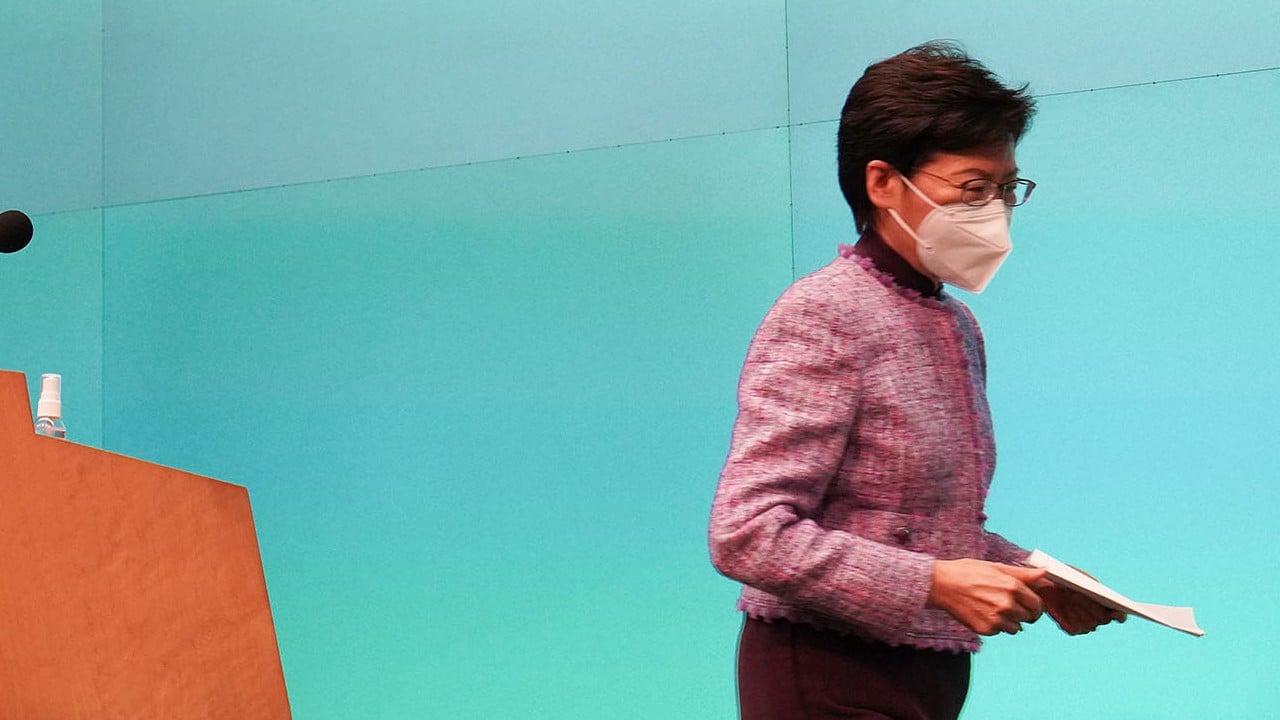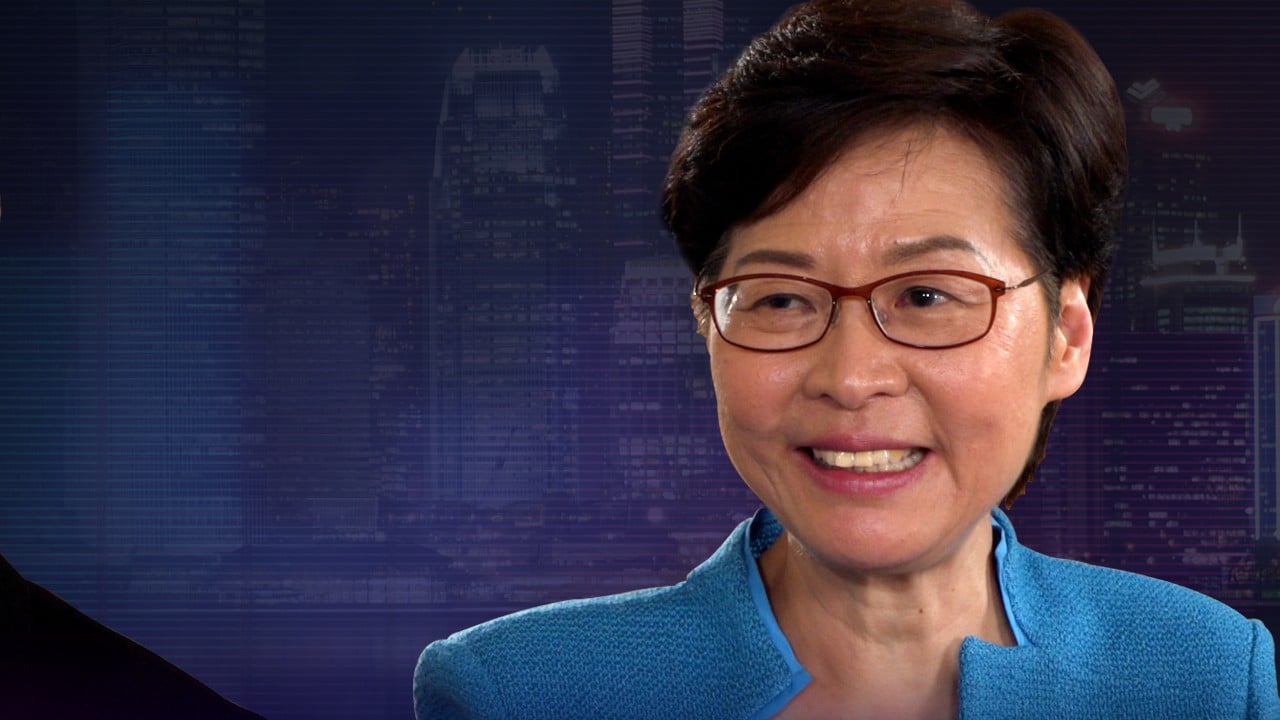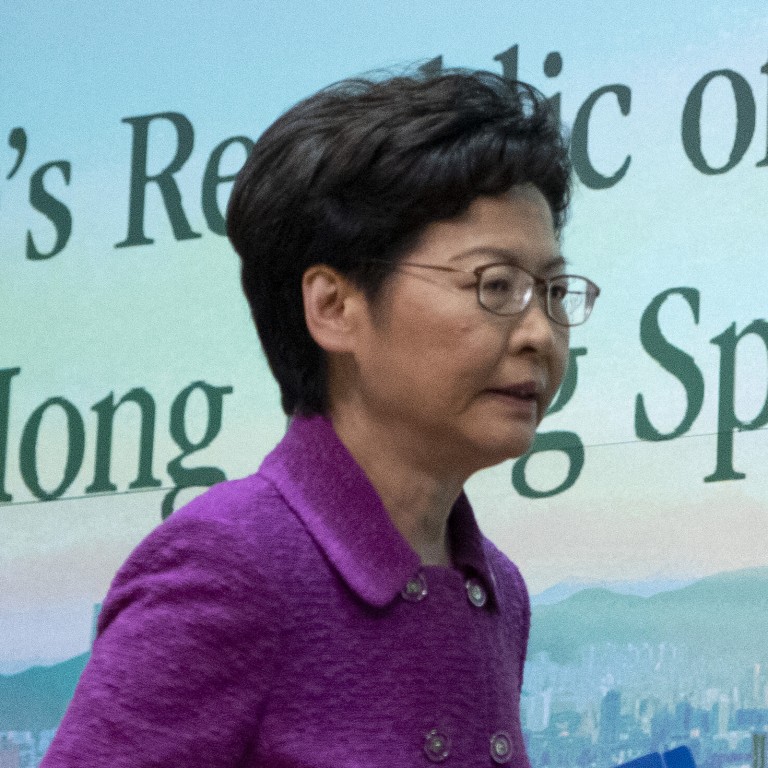
‘It’s time to go home,’ Hong Kong leader Carrie Lam says as she reveals current term will be her last
- Chief executive says she is stepping away due to her family, which had been ‘affected’ by her long political career
- She vows to focus her remaining time in office on overseeing the leadership race, fighting Covid-19, preparing for the handover anniversary and readying the next administration
Standing alone at a podium at government headquarters in the morning, Lam, 64, made the declaration that many had been expecting for weeks, if not months.
“I will complete my five-year term as chief executive on June 30 and officially conclude my 42-year career in government,” she said.
Lam thanked the central authorities, her top advisers and lawmakers for their steadfast support and explained the reason she was not seeking a second term was “entirely about my family”.
“They think it is time for me to go home,” she said. “Family is the most important part of me.”
Without elaborating, Lam, the city’s first female chief executive, said her family had been “somewhat affected” since she was appointed as a political official in 2007. She revealed she had told Beijing of her wish to step away in March last year during the annual session of the National People’s Congress.
“The central government understands and respects my decision,” she said.
Lam added that her daily press conference, devoted to updates on the government’s Covid-19 pandemic fight, was not the occasion to summarise her time in office and she expressed hope an opportunity to do so would arise in the future. But she acknowledged the momentous changes the city had undergone while she was at the helm.
“Hong Kong encountered unprecedented challenges and serious situations in the past few years,” she said.
Lam’s decision means none of Hong Kong’s four leaders since the city returned to Chinese rule in 1997 served two full terms.
Sources told the Post that Lee, 64, was expected to tender his resignation on Wednesday and “intense work” was under way to “assemble his campaign team”.
Analysts have said that a successful bid by the chief secretary to enter the race would demonstrate Beijing’s preference for a decisive leader who could tackle deep-rooted problems and minimise national security risks amid simmering Sino-US tensions.
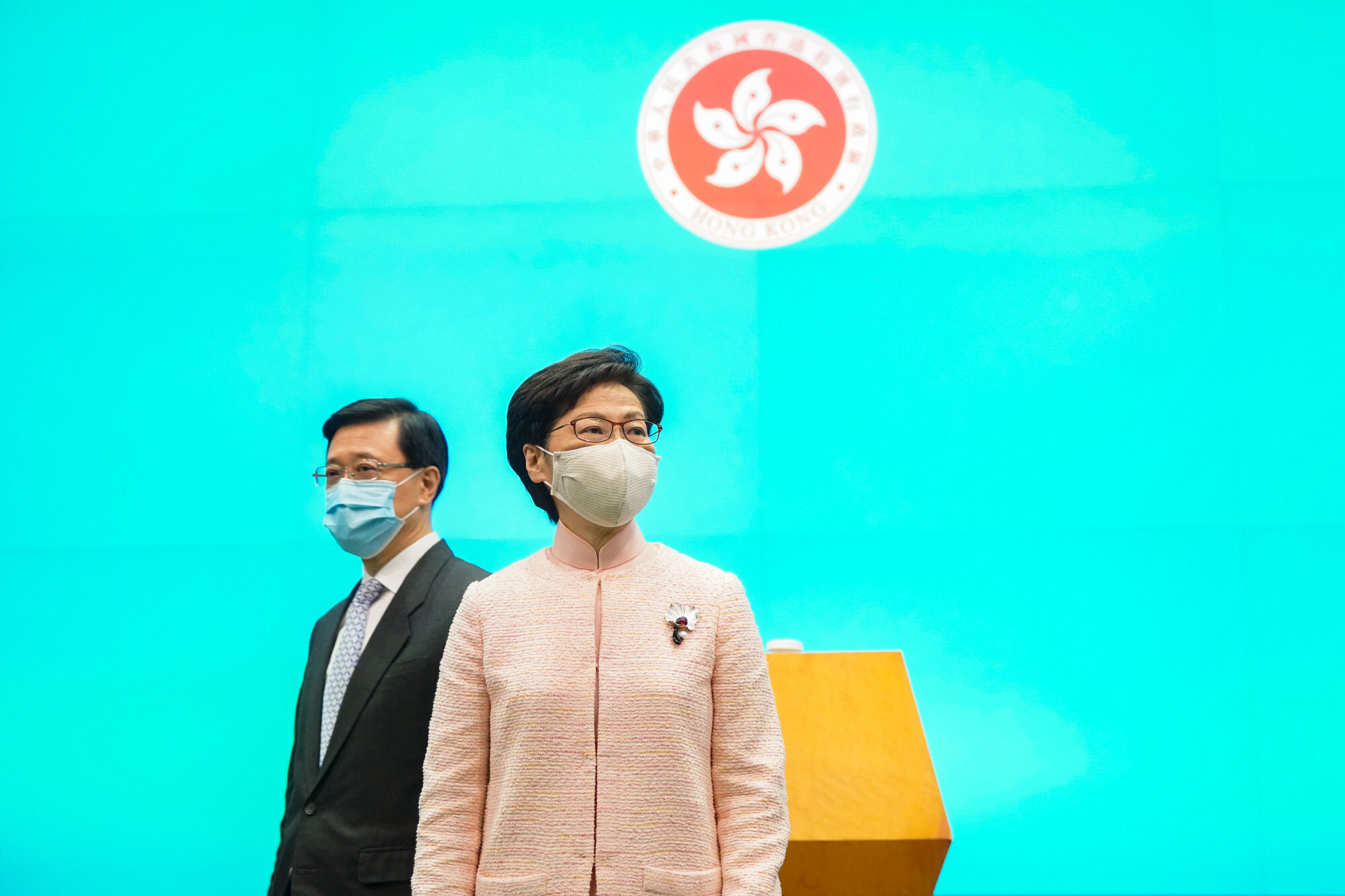
One pro-establishment insider revealed Lee had recently consulted several core members of the bloc about who should be included in his governing team.
“Lee had ideas on the names … But Beijing has not given the green light to the list,” he said.
Under the Basic Law, Hong Kong’s mini-constitution, principal officials are nominated by the chief executive and appointed by the central government.
Lee was promoted from security minister to the city’s No 2 official in June 2021, three months after Lam first informed Beijing of her decision not to seek re-election.
According to another insider, he visited Shenzhen last Friday, the same day Lam travelled there to meet Hong Kong and Macau Affairs Office director Xia Baolong.
Hong Kong election hopefuls granted exemption from social-distancing curbs
The incumbent leader, at the press briefing on Monday, said she had yet to receive a resignation letters from any official, stressing she could not “confirm or comment on” any prospective candidates.
But the “most important attribute” for a chief executive was an understanding of the dual accountability the person had to both the Hong Kong people and the central government, she added.
Lam declined to comment on her performance during her tenure, beyond saying: “It’s not a question of evaluating my performance or the performance of the Hong Kong government in this term.
“This is a question of my personal wish and aspirations. My personal wish and aspirations are entirely based on my family’s consideration.”
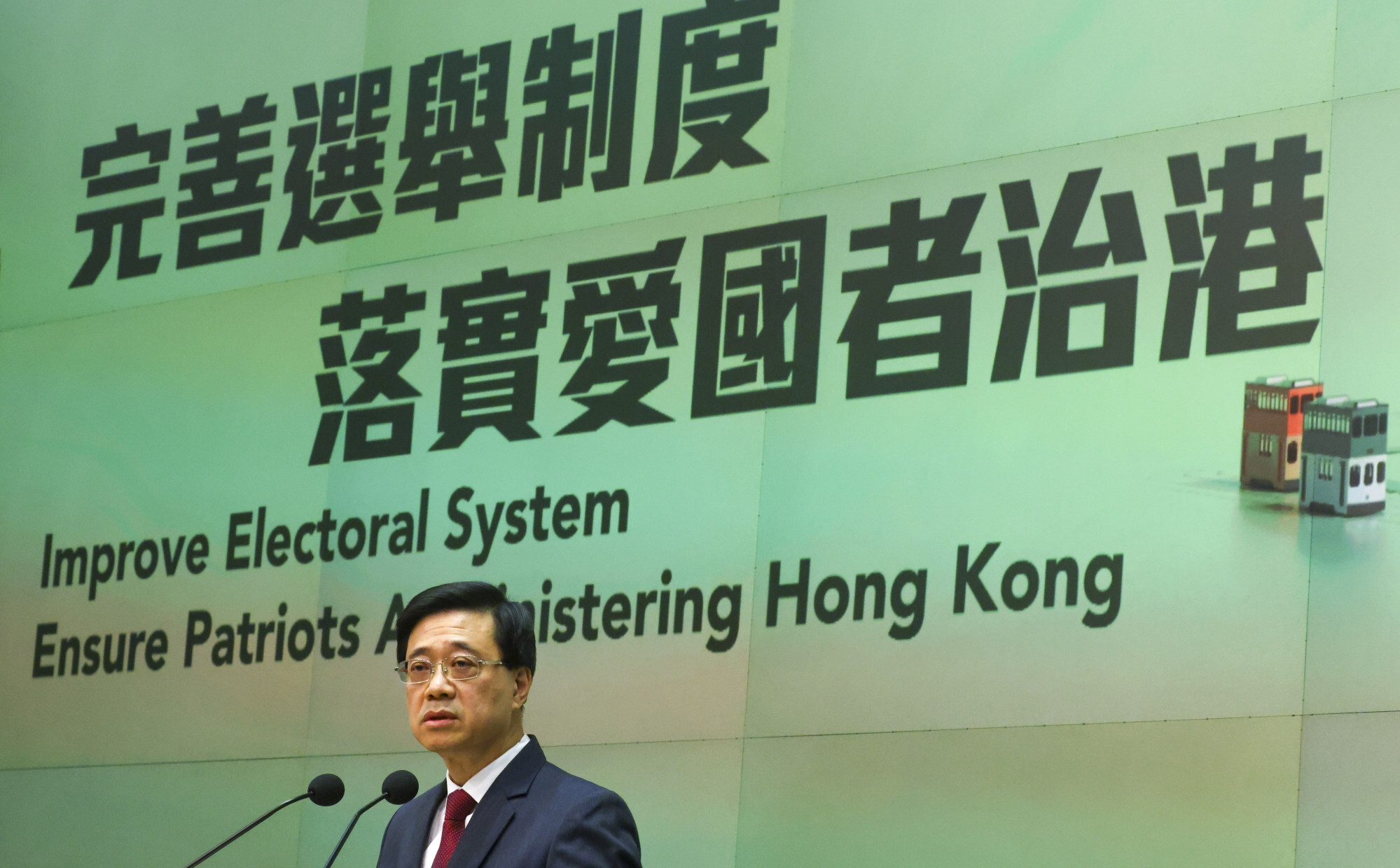
The chief executive said she would spend her remaining three months in office committed to four tasks: overseeing the leadership race, fighting the pandemic, preparing for the 25th anniversary of the handover and readying the next administration, a process that would include pushing forward her plans for a government restructuring.
They call for the construction of homes for hundreds of thousands of residents and the creation of new business focal points in a city still struggling to find its place within the national economy.
Was Carrie Lam’s legacy cut short or did she cultivate her downfall?
In arguing for the work to continue, she cited “sufficient public support” for the projects and the stable political environment following the implementation of the national security law and an electoral overhaul to ensure only “patriots” held power.
According to two insiders, Lam met her principal officials and members of her de facto cabinet, the Executive Council, in two separate meetings in the morning to inform them of her decision.
In Hong Kong, retiring from the post of chief executive does not necessarily mean the end of a political career, as two former leaders have gone on to hold an office of state leadership.
But when asked about her plans, Lam only said: “I still have not thought of what I will do next.”
One veteran politician said Lam could be appointed as a vice-chairwoman of China’s top advisory body next March when the city’s first leader, Tung Chee-hwa, was expected to step down from the role due to health concerns.
Lam joined the civil service in 1980 and rose through the ranks to become chief secretary in 2012 in Leung Chun-ying’s administration. In March 2017, she secured 777 votes from the 1,194-member Election Committee, beating former finance chief John Tsang Chun-wah and retired judge Woo Kwok-hing.
After being sworn in by Chinese President Xi Jinping during a visit to the city in July 2017, Lam enjoyed a honeymoon period with both the opposition and pro-establishment camps working with her in earnest.
For the next year, her administration focused on tackling Hong Kong’s land and housing shortages and promoting integration with the mainland under Beijing’s Greater Bay Area plan, which calls for creating an economic powerhouse by uniting 11 southern Chinese cities.
According to the Hong Kong Public Opinion Research Institute, Lam’s popularity rating was at 61 when she took office and stood at 19.3 by February 2020, in the aftermath of the anti-government chaos.
Rita Fan Hsu Lai-tai, formerly the city’s sole representative to the National People’s Congress Standing Committee, told the Post: “I believe the decision of stepping down was initiated by her … she had the most difficult term among all the chief executives in the past.”
Fan said she would be “happy” for Lee to step forward, describing him as a “logical, clear thinker” willing to listen to the views of others.
Starry Lee Wai-king, chairwoman for the city’s largest pro-government party, the Democratic Alliance for the Betterment and Progress of Hong Kong, said it was “unfortunate” that Lam’s administration was caught up in the struggle between China and the United States. But she was critical of Lam’s leadership during the latest Covid-19 outbreak.
Hong Kong’s fifth Covid wave delays Carrie Lam’s plan for government overhaul
“[It] was barely satisfactory in suppressing transmissions, testing and treatment. There was a lot of discontent among the people,” she said.
A veteran pro-establishment politician, who asked not to be identified, said Lam’s “poor handling” of the fifth wave of infections was the main reason Beijing could not justify her second term.
Lo Kin-hei, chairman of the opposition Democratic Party, said Lam’s decision to step down would be welcomed by the public given her unpopularity across the political spectrum. But he cautioned: “If the next administration fails to rebuild the trust of residents, governance will remain a key challenge.”
Lau Siu-kai, vice-president of the semi-official Chinese Association of Hong Kong and Macau Studies, predicted Lam’s exit would pave the way for a more hawkish leader who could mitigate national security risks amid “a turbulent and dangerous international situation”.
“Beijing needs someone who can push forward reform to tackle the deep-seated problems and broaden the city’s international base. A strong, decisive and bold leadership is needed to overcome the opposition from sectors with vested interest,” he said.
University of Hong Kong emeritus professor John Burns argued Lam would become a “lame duck” but the transition to the next administration should be relatively smooth given the shared policies.
“John Lee’s presence clearly indicates that the central government prioritises security and loyalty above all else, such as rebuilding the trust of the Hong Kong people,” he said.
Financial Secretary Paul Chan Mo-po, former city leader Leung, New People’s Party chairwoman Regina Ip Lau Suk-yee have been floated as contenders in the upcoming race. Sources had said Leung would be appointed chief convenor of the 1,463-strong Election Committee, which decides the city’s next leader.
Ip refused to comment on whether she was remained eager to join the race for the third time and thanked Lam for working “tirelessly” in leading the government.
Additional reporting by Gary Cheung and Ezra Cheung




